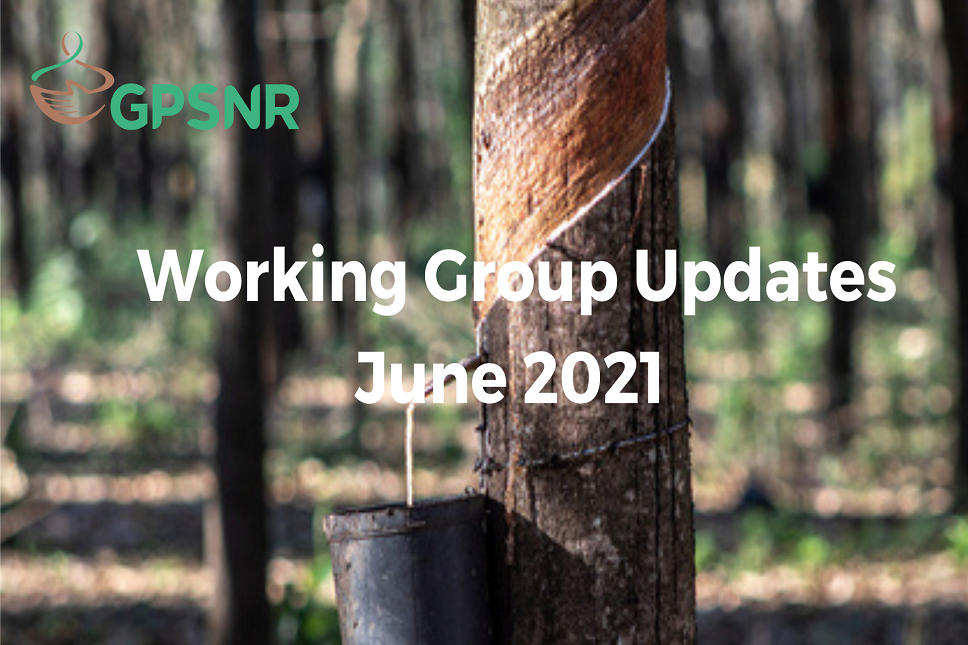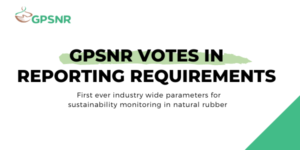What a month it has been! Here is a deep dive into working groups’ updates and progress:
Strategy and Objectives Working Group
With the finalisation of the Environmental risk assessment of natural rubber production and processing study, this working group has reviewed over 300 pages of environmental risks in the production and processing roles in the natural rubber supply chain. Additionally, the group also identified 16 countries as GPSNR priority production countries. Most importantly, the report covers outcomes and recommendations to mitigate these risks. While you can find the full report here, the co-chairs of the working group will soon be hosting a webinar to take members through the key recommendations and findings. Stay tuned!
The group has also worked on the first draft of the GPSNR Theory of Change, a complex yet interesting piece of work which fits in various pieces of the GPSNR puzzle. You can find it here. A Theory of Change workshop is also being planned on 5th August from 7-10pm SGT. Should you be interested in joining, please write to the secretariat.
Smallholder Representation Working Group
Due to the COVID-19 situation in Cambodia and India, the smallholder representation working group has had to postpone onboarding workshops for smallholders in the two countries that were planned for June 2021.
These workshops would be the first onboarding after the recent smallholder satisfaction survey, and will take into account its key findings. You can read more about the survey and its results in the May 2021 newsletter here.
The working group has also identified Sri Lanka and Liberia as two new countries for GPSNR outreach and will initiate strategies around the same, and have began outreach to new smallholders in existing countries (Indonesia, Thailand, Vietnam, Ghana and Ivory Coast)
The second Smallholders International Call of 2021 was also held on 24 June, where smallholder representatives shared and discussed key Working Group updates, as well as the newly-launched GPSNR Grievance Mechanism.
Policy Toolbox Working Group
After 12 focus group calls and corresponding surveys for the Implementation Guidance and Reporting Requirements, this working group is now finalising these two crucial pieces of work. At the same time, the group is also working on refining and finalising the development of the Compliance Panel operations guidance with an experienced consultant.
Capacity Building Working Group
The group is preparing to rollout a call for funding for immediate capacity building needs in Thailand, Indonesia and the Ivory Coast next month. The Ivory Coast and Indonesia national capacity building country subgroups are also preparing to initiate capacity building activities on the ground and these activities could commence from July onwards.
At the same time, the working group is editing and finalising a document on Good Agricultural Practices for all GPSNR capacity building activities.
Traceability and Transparency Working Group
In collaboration with the Policy Toolbox working group, the Traceability and Transparency working group is developing data collection and reporting standards. The working group also provided draft text on the traceability elements of the Implementation Guidance and will review the feedback received through the focus group surveys.
Shared Responsibility Working Group
After finalising a first round discussion of the problem statements for the natural rubber supply chain, the group has aligned these problem statements with root cause analysis for lack of equity in the supply chain. It has also conducted discussions with different member categories to propose viable solutions.
The group is now working on proposing potential solutions based on these discussions and will soon present updates to the GPSNR executive committee.





